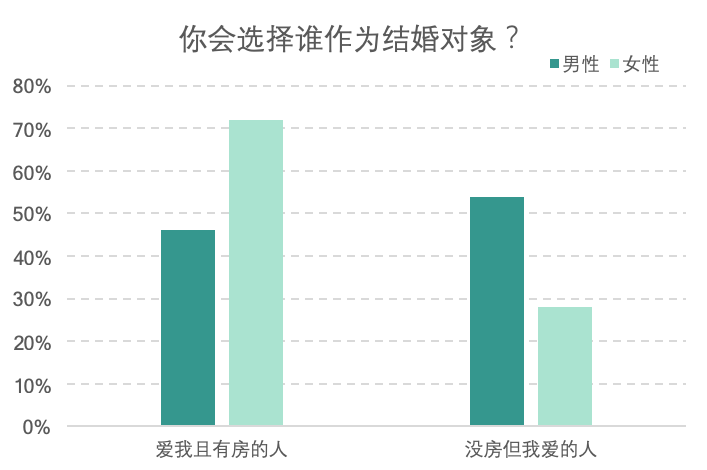60.6% of men can accept renting marriages, while only 44.9% of women are willing to rent renting marriages.
May 20, 520, homophonic “I love you”, many lovers with a longing for love and marriage On this day, expressing sweet love to each other, and also began to plan an important moment to buy a wedding room and happy home.
Marriage is the basis for young people to start a family and a business, and the marriage room is the house used for marriage. “Do you have to buy a house when you get married?” And “Are you willing to accept rent and get married?” Are there any significant changes among consumers of different ages? Through the discussion of such issues, Shell Research Institute can learn about the attitudes of different groups about marriage and residence, and see the changes in consumers’ living conditions.
Based on the online survey platform, the questionnaire was placed through random sampling, and the sample size of the effective questionnaire was 1516. With 95% confidence, we conducted the following analysis of the wedding room consumption survey:
Rent a house and get married? 55% of female respondents refuse to rent and get married
Men’s acceptance of rented marriage is higher than that of women. According to research data from Shell Research Institute, “marriage in rented houses” and “marriage without houses” are two types of marriage concepts that are more prevalent in today’s society, accounting for almost the same proportion. However, in terms of gender, male and female students have very different attitudes towards the acceptance of rented marriages. 60.6% of men can accept rented marriages, while only 44.9% of women are willing to rent marrieds. The traditional concept of “having a house before having a home” is more obvious among the majority of female groups.
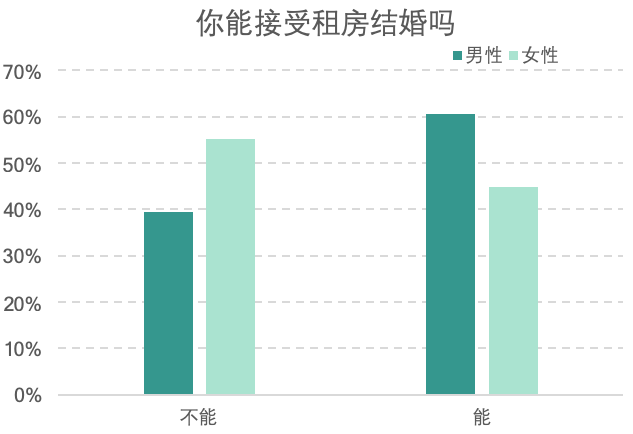
The younger the group, the lower the acceptance of rented marriage. Respondents’ attitudes towards rented marriages also differ significantly among groups of different ages. The younger the group, the higher the proportion of those who refuse to rent and marry. The proportion of groups refusing to rent and marry has reached 56%, which is even higher after 00.
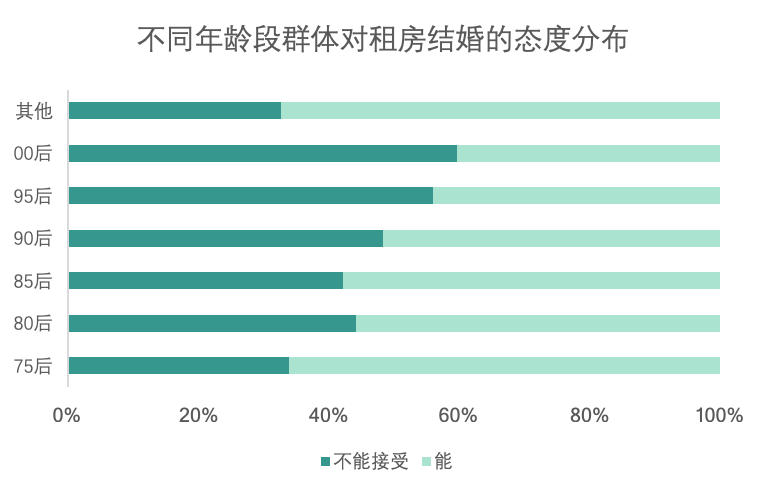
Males have compromised with reality, and nearly 50% have prepared marriage rooms for marriage. The home is the home of the married person, and the house is a guarantee to maintain the happiness of the marriage. Most people have prepared or will buy their own wedding room before marriage, and only 7.5% will not prepare the wedding room.
Although men ’s acceptance of rented marriages is relatively high, from a practical point of view, men ’s enthusiasm for preparing a marriage room is stronger, and nearly 50% have already prepared a marriage room before marriage, which is 20 percentage points higher than the female group. To a certain extent, this also reflects the male group ’s “compulsion” of women and mother-in-law ’s “persecution” of buying a house before marriage.
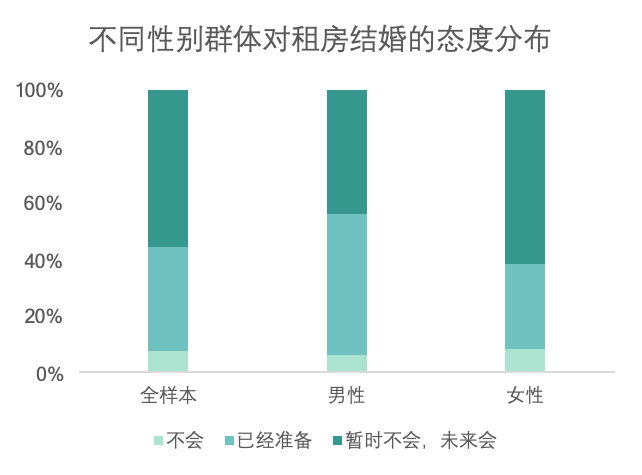
The primary reason for refusing to rent a house and get married: Only when you have a house can you feel secure. Why refuse to rent a house to get married? In the traditional concept of the Chinese people, they still put their sense of security in a house, and preparing a wedding room seems to have become a rule. Second, preparing for a marriage room is also a guarantee for the child ’s future life. Renting a house is not stable, and there are also major problems in the child ’s hukou and schooling. 34.4% of the respondents said that refusing to rent a house for marriage is to consider the child ’s future.
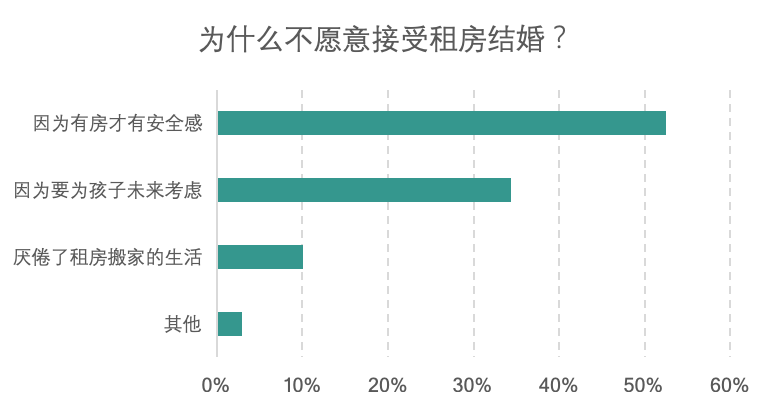
Marriage room funding source: both parties share the responsibility, but also have to fight for parents
In the event of buying a marriage room, it is not just a single obligation of the man and his family. Most women are also willing to bear the pressure of buying a house together with the man. Among those who have bought a marriage room, 47.7% of them The interviewee stated that the man and the woman jointly shouldered the down payment for buying a house and paying the loan.
At the same time, in the face of high housing prices, buying a wedding house is indeed a huge expense for some groups, so buying a marriage house also requires “fighting parents”. Compared with the source of funds for the group who will buy a marriage house in the future, in reality, the dependence on both parents is greater, accounting for nearly 7 percentage points.
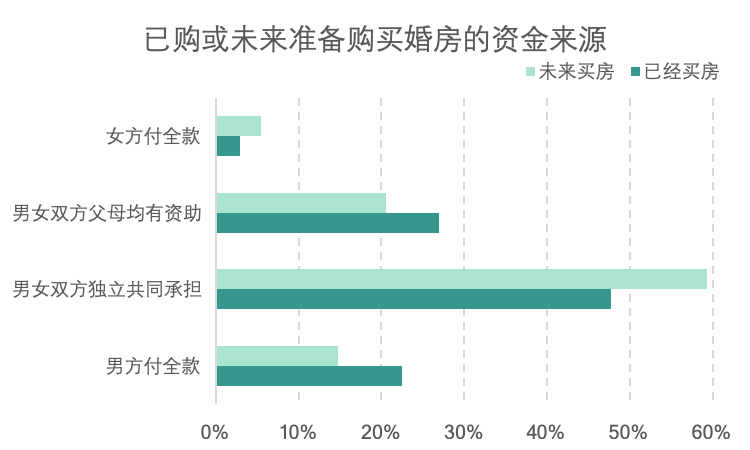
Houses under 1.5 million, wedding room demand dominates
According to the samples of married houses purchased and future considerations of marriage and house purchase, less than 1.5 million is the range of funds generally selected by the respondents, accounting for more than 60%. Relative to the budget budget distribution that will consider the sample of marriage to buy a marriage room in the future, in reality, people who have bought a marriage room have a higher acceptance of high-priced houses, with a total price of more than 2 million units accounting for 18.7% , 4.8 percentage points higher.
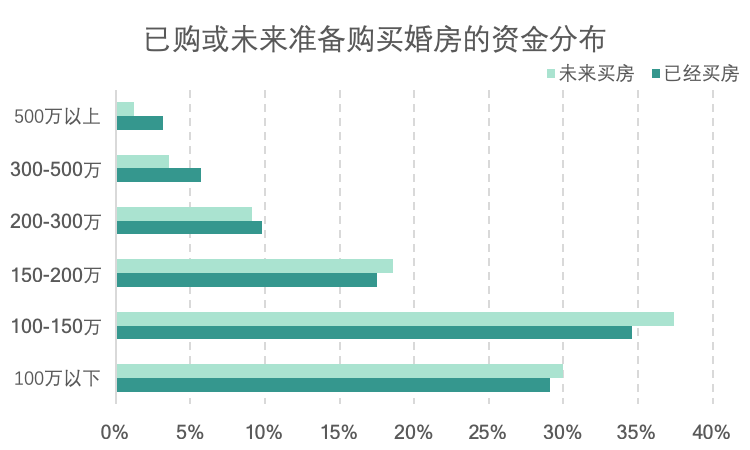
Whose name is written on the property certificate? More than half of the signed couples
The ownership of the marriage house is a question that every married family must carefully consider. According to the survey data of the Shell Institute, 53.2% of the respondents said that no matter who pays, the property certificate should be written on both parties Name, and the desire after 75 is even stronger, accounting for 72.2%. The husband and wife signed on the real estate certificate are not only the definition of the ownership of the house property rights, but also the guarantee for maintaining family harmony and reducing uncertainty disputes.
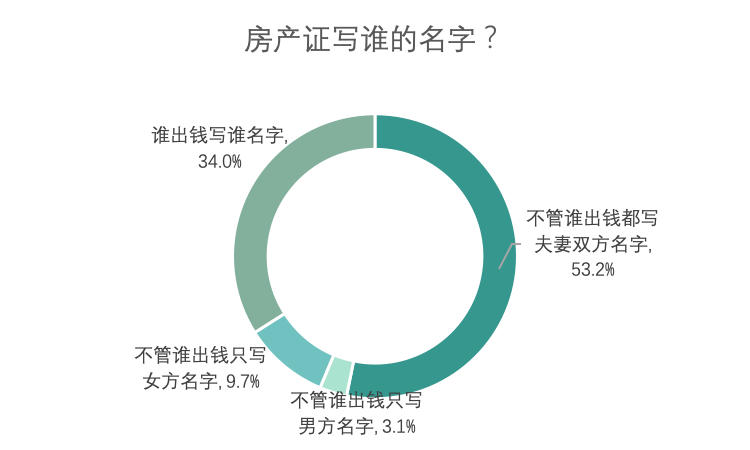
Table: Attitudes of different age groups on the signing of real estate certificates

Data source: Shell Research Institute
There is a room before marriage, nearly 40% of women require men to have a room
Males have a room before marriage, generally do not force women to have a room, only 14.8%Girls will also be asked to buy a set; if girls have a room before marriage, the attitude towards boys is also stronger, accounting for 37%, and the actual situation is that female respondents who have already prepared a marriage room, about 48% require that the partner also have a room, a significant increase. From the perspective of women, having a house before marriage is an important indicator to test the economic strength of the man’s family, and having a house is a guarantee for a stable life in the future.
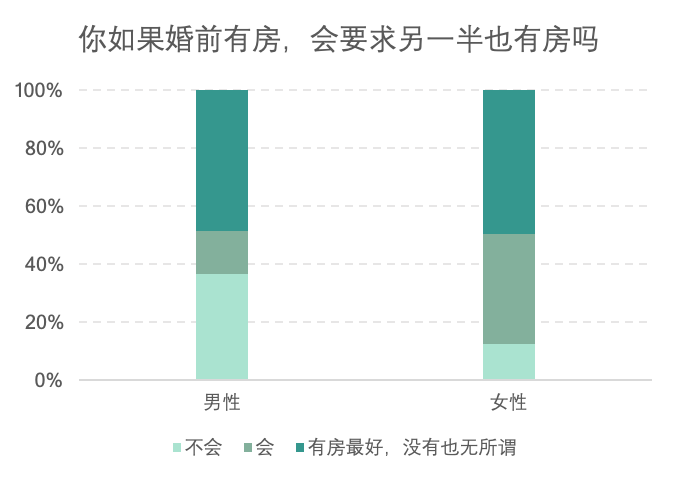
Parents ’marriage room preparation is traditional, and the pressure of mother-in-law is nearly four times that of mother-in-law
Parents preparing marriage rooms for children (especially sons) is a traditional concept that Chinese families have long formed. The survey shows that only 4.8% of respondents believe that parents do not need to prepare marriage rooms for children. When marriage is linked to a house and the “mother-in-law” style of buying a house is promoted, the pressure on men ’s families to buy a house increases greatly. The ratio of “room” is 9.3%, and the pressure of mother-in-law is nearly four times that of mother-in-law.
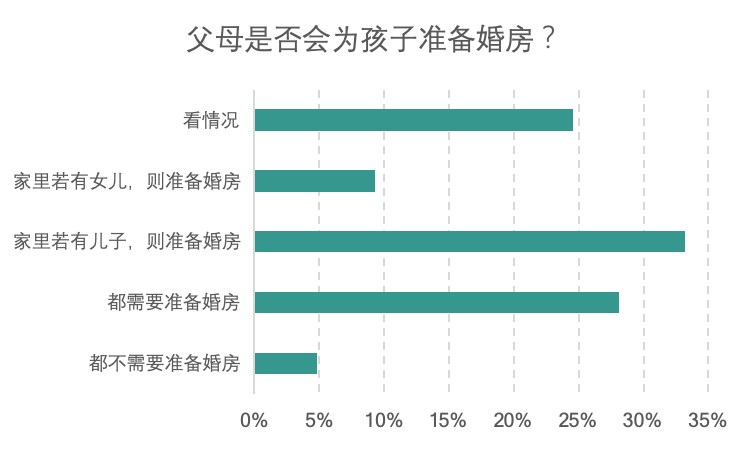
After marriage, living with parents, girls are more pursuing “distance produces beauty”
Do you want to live with your parents after marriage? Men and women have different views on this. Boys can accept the most living with parents of both parties, accounting for 36%; girls refuse to live with either parent, accounting for 36%, while girls with housing choose to accept more, accounting for about 33.2%. Boys are more willing to live with their parents to a certain extent because parents can take care of daily life problems, while women are more reluctant to live with their parents based on the consideration of contradictions between the two sides.
In addition, compared with living with their own parents, both men and women are more inclined to live with each other’s parents.
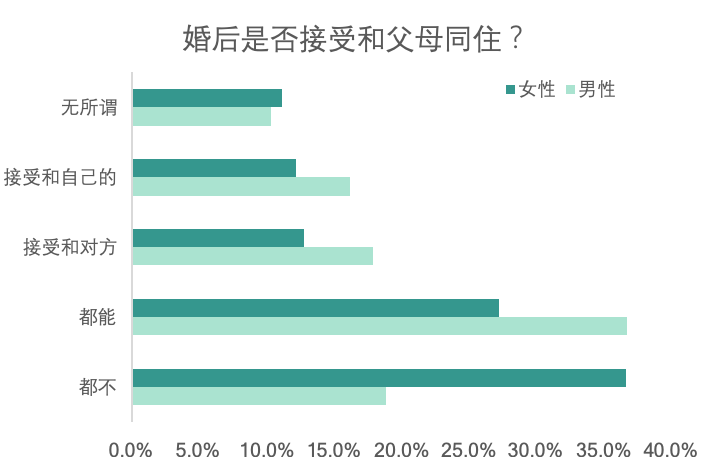
There are also significant differences in the attitudes of different age groups towards living with parents after marriage. People before 90 years are more able to accept living with their parents, while people after the 90s generation are pursuing an independent and free life and are unwilling to be intervened too much by their parents, so it is the mainstream attitude to refuse to live with their parents.
Table: Attitudes of different age groups towards living with parents after marriage

Data source: Shell Research Institute
Women’s “substance”, taking into account bread and love
“The person you love has no room, the person who loves you has a room”, who will you choose to marry? The survey data shows that men choose “no room but I love” a higher proportion, accounting for 54%; women choose “love me and have a room” as high as 72%. In contrast, women appear more “material” in front of reality, not only will they see the key element of “having a room”, but also explicitly choose “people who love me” instead of “my love” “People”, it may be too difficult to find someone you really love.
